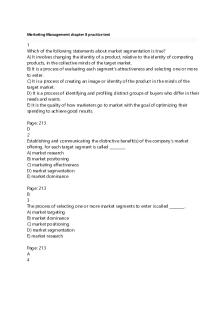Chapter 8 weight management PDF

| Title | Chapter 8 weight management |
|---|---|
| Course | Principles of Conditioning |
| Institution | Louisiana State University |
| Pages | 4 |
| File Size | 59.5 KB |
| File Type | |
| Total Downloads | 4 |
| Total Views | 149 |
Summary
lecture ...
Description
Chapter 8 (Weight Management) Exam 2 Notes
10/13/2016
Watched a Video (link is on moodle) Three common eating disorders Anorexia= deliberate food restriction extreme weight lose. Below 18.5 on the BMI scale Bulimia= excessive eating then purging by vomiting or taking a laxative.
Binge eating disorder (BED)= binge eating thousands of calories in one sitting. Typically over weight
Eating disorders have a distinctive symptoms and identifiable features Eating disorder can be effectively treated through medical and psychological therapies.
Make sure the person who is going through the eating disorders have a strong support system.
Must learn new
Eating habits
Build self confidence Help cope with anxiety, depression, and stress.
Check out think pattern chart. Key concepts in achieving Weight Goals Recognize the role of metabolic rate:60-70% caloric intake is consumed for basic function for living. o Basal metabolic rate (BMR)=rate at which your body uses food for live sustaining functions. o Resting metabolic (RMR) = your BMR+ the energy you expend when you digest food. Muscles burns more fuel than fat tissue The more fit you are the more calories you will burn throughout the day.
Recognize your body’s set point- a preprogrammed weight that your body returns to easily when you gain or lose small amounts of weight. o Biologically and genetically determined. No control over.
o Range= 10-20 pounds o If you go below your set point Both appetite and metabolism will change and deplete. o For women the reproductive organs can shut down do to such low weight. o People who do extreme diets can actually have binge cravings do to the mal nourishment.
Balance your energy equation – or to lose or gain weight, “unbalance” that equation. o Want to loose weight: maintain a negative caloric balance; expend more calories then what you actually consume. o Want to gain weight: consume more calories then expending. o Isocaloric balance: you consume the same amount of calories as you put out. You extend the same as you put in.
Weight Management Know your current weight Realistic goal (1-2 pounds per week) Know your body type Contemplate weight management
Prepare for better weight management o Why are you trying to gain or loose weight o Make sure there are goals and rewards when you actually achieve them. o Visualize new behaviors
Take action Establish a regular exercise program o Essential for overall health
Achieve weight maintenance o Weigh yourself once a week o Track your calories
Take o o o
lessons form successful weight maintainers People who stay physically active People who eat all meals People who better handle daily situations
o Self motivated based on how they feel o Have a good social support system.
10/13/2016
10/13/2016 ...
Similar Free PDFs

Chapter 8 weight management
- 4 Pages

Chapter 9: Weight Management
- 9 Pages

Chapter 8 - Managing Your Weight
- 8 Pages

Chapter 8 Project Quality Management
- 44 Pages

Chapter-8 - chapter 8
- 13 Pages

Apparent weight
- 4 Pages

Modul 8 - Management curs
- 18 Pages

Mass and Weight WS
- 2 Pages

Strategic Management - Grade: 8
- 12 Pages

Pmbok 8 - Quality Management
- 10 Pages
Popular Institutions
- Tinajero National High School - Annex
- Politeknik Caltex Riau
- Yokohama City University
- SGT University
- University of Al-Qadisiyah
- Divine Word College of Vigan
- Techniek College Rotterdam
- Universidade de Santiago
- Universiti Teknologi MARA Cawangan Johor Kampus Pasir Gudang
- Poltekkes Kemenkes Yogyakarta
- Baguio City National High School
- Colegio san marcos
- preparatoria uno
- Centro de Bachillerato Tecnológico Industrial y de Servicios No. 107
- Dalian Maritime University
- Quang Trung Secondary School
- Colegio Tecnológico en Informática
- Corporación Regional de Educación Superior
- Grupo CEDVA
- Dar Al Uloom University
- Centro de Estudios Preuniversitarios de la Universidad Nacional de Ingeniería
- 上智大学
- Aakash International School, Nuna Majara
- San Felipe Neri Catholic School
- Kang Chiao International School - New Taipei City
- Misamis Occidental National High School
- Institución Educativa Escuela Normal Juan Ladrilleros
- Kolehiyo ng Pantukan
- Batanes State College
- Instituto Continental
- Sekolah Menengah Kejuruan Kesehatan Kaltara (Tarakan)
- Colegio de La Inmaculada Concepcion - Cebu





